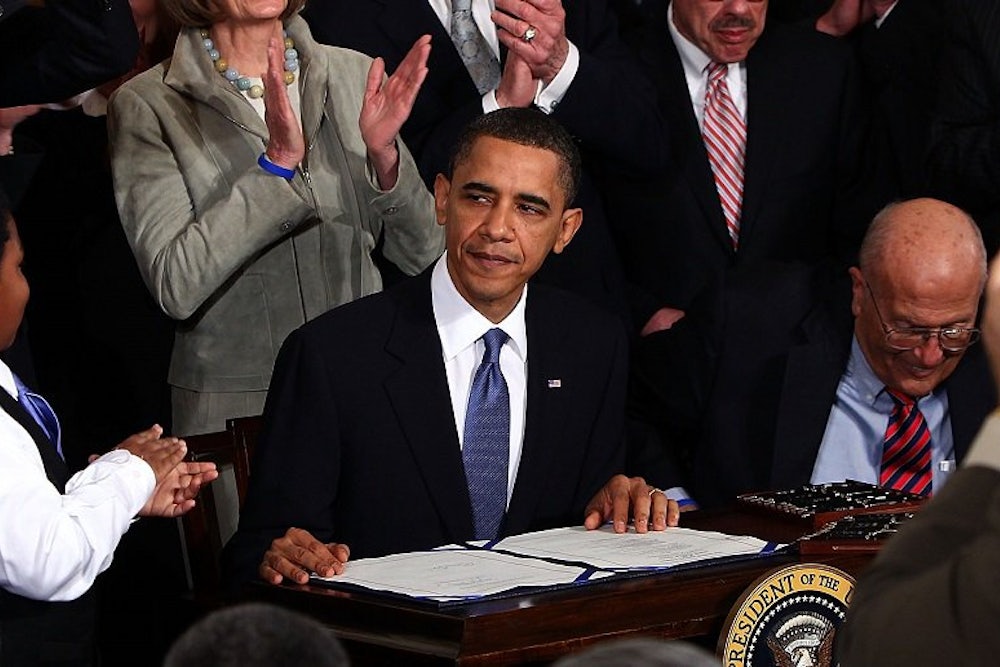Since income inequality has grown significantly over the past few decades, you might expect support for government redistribution to grow as well. As Americans see the rich get richer and the middle class shrink, the theory goes, they would support higher taxes on the rich and a larger safety net. But that hasn’t happened. In fact, Americans have become slightly less supportive of government policies that reduce income inequality over the past 30 years, and support for redistribution has declined most for two groups of Americans that disproportionately benefit from redistributive policies: the elderly and African-Americans.1
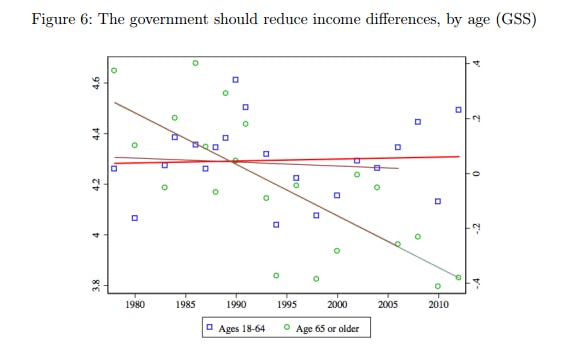
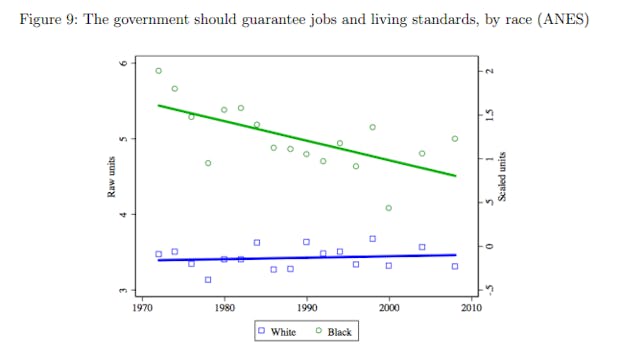
That’s the finding from a new paper by Vivekinan Ashok, Ilyana Kuziemko and Ebonya Washington (I’ll refer to them as “AKW”) which will be presented Thursday afternoon at the Brookings Institute’s spring conference on economic activity. AKW attempt to explain why older and black Americans have become more opposed to income redistribution. Their findings offer an important lesson for the Democratic Party about how to design policies that retain significant political support.
AKW controlled for a number of different economic variables to try to explain the declining support for redistribution among the elderly and African-Americans. Though income inequality has increased over the past few decades, maybe the elderly and African-Americans are feeling more positive about their economic situation and that has led to the drop in support for redistribution. But that doesn’t seem to be the case. When the authors control for household income, for instance, they find that for both seniors and blacks, it has no explantory value. Using education as a proxy for income—since “actual income may be a noisy proxy for economic well-being”—explains about one-quarter of the elderly’s decline in support for redistribution. But that’s it.2
Another potential reason the elderly, in particular, have become more hostile to redistribution: maybe they have become more conservative. AKW test that hypothesis as well—and it also comes up short. “[F]or neither blacks nor the elderly is the decline in redistributive support explained by a general movement towards conservatism,” they find. And: “As these coefficient patterns suggest, despite their movement away from redistribution, blacks and the elderly have become no more relatively Republican.”
So, why have African-Americans and the elderly become less supportive of redistribution? On the former, AKW find that it is connected to the corresponding changes in black views about economic fairness—whether income is deserved or not. Using the General Social Survey (GSS), AKW find that “blacks are on average more likely than whites to say luck is more important hard work.” That’s not surprising since blacks face far more economic and societal disadvantages than whites do. But while the black-white income gap has not decreased substantially over the past few decades, the black-white gap on the role of luck in success has decreased considerably.
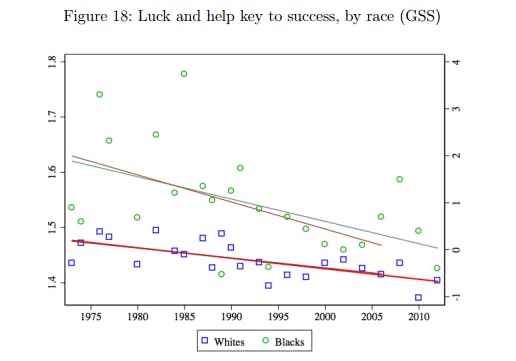
As the authors conclude, “Blacks view the economic system as becoming increasingly fair and are decreasingly supportive of the government targeted aid based on race.” When AKW use that GSS question as a control, they find it “explains 45% of the decline in black support for redistribution.”
What about for the elderly? AKW also discovered that the declining support for redistribution among older Americans is “a uniquely American phenomenon.” While the language of the questions varied, surveys in the United Kingdom, Germany, Sweden and Australia all found that the elderly’s views of redistributive policies has increased or stayed constant over the past few decades. This is important because, as the authors note, “the U.S. social insurance system exhibited a key difference, relative to that in other developed countries, vis-a-vis the elderly: they alone were guaranteed government provided health insurance.” Maybe, AKW posit, older Americans have become more fearful that increased government redistribution will threaten their Medicare. In turn, as those fears have grown, their support for redistribution has declined.
An interesting theory, and there's evidence to back it up. The GSS survey also asks respondents about whether the government should cover medical bills. Over the past few decades, the elderly have seen a steep drop in support for government health insurance, while the rest of the country has become more supportive of government health insurance.
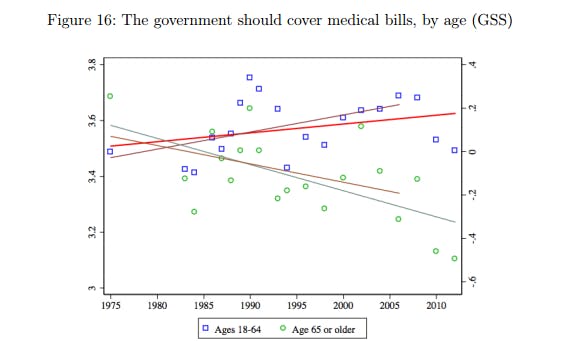
“More relevant for our analysis,” the authors write, “controlling for this variable has a meaningful effect on the elderly differential trend over redistributive preferences.” Using data from a different government survey delivers the same results.
What can Democrats, as the party looking to build greater support for redistribution, learn from AKW’s findings? For African-Americans, there may not be much. Democrats can reiterate that luck does play a part in success and emphasize that the black-white income gap is still substantial. But they should still strive to close that gap. If doing so further erodes support in the black community for redistributive policies, so be it.
However, Democrats can learn a lot from the elderly’s declining support for redistribution. As AKW note, it’s a bit strange that the elderly have become less supportive of government health insurance. “One might ask how,” they write, “by the end of our sample period, seniors can be less supportive of the idea that government cover medical bills given that they, uniquely, are categorically entitled this coverage.” There's a simple explanation: Seniors don’t think the government helps them pay for health insurance. A recent Economist/YouGov poll found that 93 percent of Americans over the age of 65 said they don’t receive a government subsidy to pay for health insurance. (Nearly all seniors receive a subsidy via Medicare.)
This throws a small wrench in AKW’s theory. How can seniors think that further redistribution is a threat to them if they don’t think they receive a government subsidy for health insurance? Yet, the fall in support for government health insurance indeed did explain their declining support for redistribution. I think that their theory needs a small tweak then. Seniors don’t feel threatened by further redistribution but they find it unfair. I’m not receiving government help for my insurance, they might (wrongly) say, so the poor shouldn’t receive help either. This would also explain why seniors are so opposed to Obamacare.
As professor Suzanne Mettler explained in her 2011 book, The Submerged State, many government policies are not easily visible to the vast majority of Americans. These include health insurance programs and the more than $1 trillion in tax credits, deductions and exemptions that benefit Americans each year. The problem is that Americans don’t realize that they benefit from these policies, creating no constituency to support them. That makes them politically vulnerable.
If Democrats want to create sustained support for redistributive policies, they should make them more explicit. Instead of using the tax code to deliver those benefits, they should do so through government spending. Instead of expanding tax credits for child care, for instance, they should propose a monthly child allowance. Like everything these days, it would be hard to get Republicans to support such a plan. But if passed, it would build a powerful constituency (parents) who would fight any attempt to roll it back.
The fact that three decades of increased income inequality has not led to a corresponding increase in support for redistribution should concern Democrats. AKW have done useful work in finding that support has declined most for seniors and African-Americans. But there are no silver bullets that will reverse those trends. Instead, Democrats need to learn from their failure to build greater support for more redistribution. How policies are designed doesn’t only matter for policy reasons. It matters politically, too.
In the four graphs in this piece, ignore the numbers on the left and right axes. What really matters are the trends in each graph, with high values indicating more support for the specified variable and lower numbers indicating the opposite.
AKW also use more subjective measures of happiness as controls. For instance, they use what class the respondent sees themselves in, as reported by the General Social Survey (GSS). “For neither group do these controls go very far in explaining the differential trends,” the authors find. Views on intergenerational mobility also failed to provide any explanatory insight.
